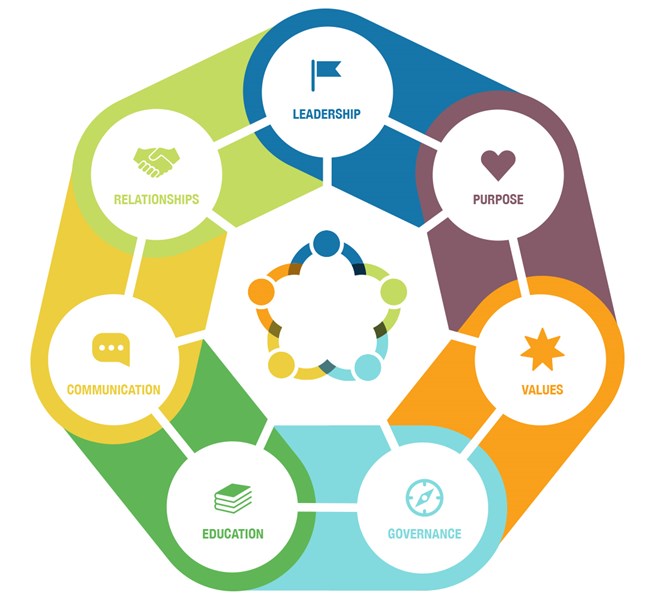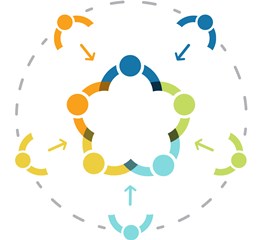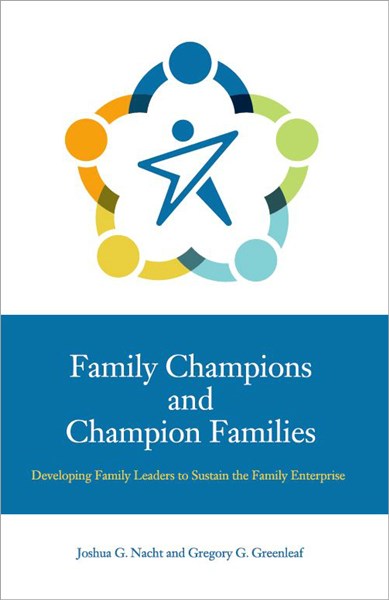Much has been written about how family business owners can beat the odds of “shirtsleeves to shirtsleeves” in three generations. But far too often families wait until a business crisis or a disruption in family harmony that forces them to create policies, procedures, and governing bodies such as Board of Directors and Family Councils that help families navigate the challenges of being a business-owning family. There is, however, the rare family that doesn’t wait for a crisis but rather anticipates and plans for change and transition. These families, often working with the guidance of an experienced family business advisor, estate attorney and wealth planners, are proactive enterprising families that don’t play from behind. These families are champion families.
A champion family is a business-owning family that has actively and intentionally invested in its development and has created long-term success as a group. Champion families typically are larger multigenerational families that have thoughtfully managed the complexity of their situations and performed well as a large, growing ownership group. These families proactively invest in the development of seven key areas: leadership, purpose, values, governance, education, communication and relationships. Champion families do not achieve success by chance or accident. They deliberately invest the time and energy to overcome their challenges and make the most of their potential. Champion families are an inspiration and guide to other business-owning families, and we have learned a lot from our champion family clients who have thrived across generations.
Champion families share seven notable hallmarks that make up the foundational elements of success for business families. This assessment is based on our extensive personal experience working with families, as well as established perspectives from colleagues through the field of family enterprise consulting. Each element helps promote performance, continuity, and family harmony, and are generally seen across successful business families. Consider your progress or needs pertaining to each of the elements described here.
Seven Elements of Success

Leadership: Distinct Leaders for the Business and Family
Champion families have dedicated leadership for both the business and family. These leaders have specific skills and attributes that let them excel in their domain. For instance, a family champion acts as a catalyst to facilitate significant development throughout the family by engaging and inspiring everyone to work collectively to sustain their legacy. Separate but complementary leadership specific to both business and family ensures that each aspect of the system receives specific and proper attention. Leaders work together in a complementary fashion, while also respecting boundaries between family and business.
Purpose: Alignment and Clarity
Having a clear sense of purpose gives meaning to the work the family invests in and helps support the development of what we call patient capital. This term refers to how business families approach their finances with a long-term perspective and allows them to make decisions with a far-horizon time frame. An aligned vision is a key factor in producing successful results. Vision is closely related to purpose, and we believe that having a clear vision is essential to champion families because it gives direction and inspires action. Champion families make decisions based on the clear intention to achieve their purpose and vision.
Values: Clearly Defined Guiding Principles
While purpose gives direction, the family’s values help provide the why for doing the work and guide decisions about family employment, ownership, and conflict resolution. Values evolve from family culture, and they inform and perpetuate it. Values shape how family members treat one another and other stakeholders (employees, customers, suppliers, and the broader community), and are clearly articulated by the family.
Governance: Robust and Specific Governance Structures
Governance is a broad term for an organized way to guide a group of people and to make decisions together. Governance applies to the family (a family council or ownership council) and business (board of directors). These structures work together and have distinct areas of focus. Family members can serve on both, connecting family and business productively. Effective governance is an essential way for business families to steward the business and manage the complexities of growing families in an aligned and systemic fashion.
Education: Striving for Growth and Fostering a Learning Culture
Champion families recognize the complexity and challenge of caring for a family enterprise. Through continuing education for both family and individuals, they create a culture of growth and development for family members of all ages and generations. Education is approached as a long-term investment that supports a culture of continuous development. The family might bring in educators, consultants, and professionals to introduce specific content.
Communication: Healthy Interactions
Champion families pay close attention to how they communicate and interact. For many families, working on communication is the single most important activity because it is so foundational in nature. Effective communication and fair process produce a culture of meaningful interaction, trust, transparency, and open-mindedness. Champion families often have communication agreements that address codes of conduct and provide policies, guidelines, explicit standards, and expectations.
Relationships: Strong Interpersonal Connection
Families who love and feel affection for one another are more willing to do the hard work of being owners together. In looking at the failures of business families, poor relationships and family dynamics are common contributors to strife, failure, and negative outcomes. Respect and strong relationships produce and sustain the bonds that make family members want to be together for a greater good. “I deeply love my family and want us to be wildly successful together,” one business family member we know said. “Not just in the business, but in the family.” An investment in good relationships helps champion families manage their discord productively. Families inevitably have disagreements—it goes with the territory. But champion families resolve conflict in a fair and inclusive way. They strive for greater trust and better relationships through a healthy resolution of conflicts.
A Champion Family in Action
Let’s look at a family that has consistently invested in their growth and capabilities as a family. The Proactive Anderson Family is an excellent example of a champion family, and they illustrate how hard work and dedication as a family can lead to positive results.
The Proactive Andersons
On the outskirts of a small Midwestern town is a billion-dollar business with diversified holdings in professional services, construction, and real estate. The Anderson family owns an enterprise that includes more than 15 companies with operations in three states. The business family now includes three generations. Five siblings of the second generation—two sisters and three brothers, all in their late 40s to late 50s—lead the business with the assistance of a team of talented non-family executives. The founding generation is no longer active in day-to-day operations, but the patriarch is active in identifying new business opportunities. Three third-generation members and two in-laws work in the business as well.
The family recently formed a continuity planning committee including the matriarch, patriarch, all five second-generation siblings, Chief Financial Officer, estate planning attorney, and their family business advisor to develop a multiyear plan for ownership and leadership succession. The Andersons created the committee when the older second-generation siblings realized they needed to plan for their own leadership succession and move out of an operating role within five to seven years. Additionally, the size of the fast-rising third generation (15 members, the oldest in their mid-20s) means it’s critical to educate and integrate these new owners into the governance process.
Following the lead of their parents and grandparents, two cousins in the third generation stepped up and organized monthly meetings where the cousins discuss business and family matters. Their goal is to become more informed, capable stewards. Each meeting has a structured agenda with agreed-upon discussion topics. Building on the education programs they attend at their family’s annual stakeholder retreat, several of the older cousins volunteered to study one of their operating companies and prepare a high-level update. In addition to helping them understand the family’s business, this exercise allows them to demonstrate and build their skills.
On the business governance side, the Andersons are developing a formal holding-company advisory board that includes the founders, all second-generation siblings, and outside advisors. This group will evolve into a fiduciary board with independent directors. In thinking about any of these efforts, the family considers implications within and across the three circles of family enterprise—family, business, ownership, and adjusts their strategies accordingly.
All siblings live within easy driving distance of one another, and the extended family meets often for holidays, barbecues, and other family events. These get-togethers feature a balance of casual conversation and shop talk. Beyond such casual interactions, the family also has a conflict resolution policy that stipulates members do their best to work out issues among themselves first, and then to escalate as needed to an impartial person within or outside the family. So far, the system has worked well to foster healthy resolution and avoid the buildup of resentment. The Andersons continue reaping the material and intangible rewards of their enterprise.
Moving Toward Family Championship
Champion families have a tremendous amount to teach us about how they have achieved their success across generations. By looking at aspects of your leadership, purpose, values, governance, education, communication and relationships, you can create a strategic plan with your family that fosters the development of each of these vital areas. Acting proactively and with intention can help families who are in business together truly become Champion Families.
For more information about this topic, read Family Champions and Champion Families: Developing Family Leaders to Sustain the Family Enterprise. Available on Amazon.
September 5, 2018

